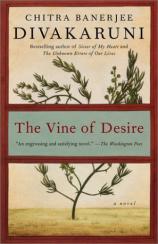The Vine of Desire
Review
The Vine of Desire
Chitra Banerjee Divakaruni writes about what she knows and feels. And she is at her best exploring the themes of love, friendship, assimilation, self-analysis, and discovery. Divakaruni has carved out a very a special place in Indian literature –-- that of being a storyteller of immigrants, especially women, who must face the contradictions between the country they left behind and the one that they must call home.
In that aspect, the award-winning author and poet's work always contains autobiographical elements. THE VINE OF DESIRE is a sequel to her earlier novel SISTER OF MY HEART, in which she explores the emotional bond between two cousins, Anju and Sudha, whose lives have been entwined by birth in their native city of Calcutta. We leave them leading separate lives in America and India, respectively.
In THE VINE OF DESIRE, devastating events in both of their lives bring them together: Anju in America has had a miscarriage, and Sudha has walked out of her in-laws' and husband's house; she has refused to give in to their command of having an abortion when the fetus was declared to be a girl. She also is escaping from the suffocating embrace of her first love and former boyfriend, who insists on taking care of her and her daughter.
Hurt, aching and saddened by the events of their lives, they reach out to one another for comfort and affection when Sudha arrives in California. Complications arise when Anju's husband's Sunil discovers he is still deeply attracted to Sudha, whom he met on the night of his marriage to Anju.
The tension between the wife and husband's already broken marriage and their awareness and self-consciousness of literally having a third person in the marriage create some nerve-racking moments. They do not voice their feelings, choosing instead to focus on Sudha's toddler Dayita, whom everyone adores, especially Sunil, who forms a special relationship with her.
Sudha is alternately soothed and stifled as she assumes the role of the maid, cleaning, cooking and caring for the household, as Anju, forced to deal with her restlessness, goes back to college and realizes that she can write. This also becomes her escape from her growing dissatisfaction with her marriage.
In a small two-bedroom apartment, the lives of two women who know each intimately, a man and his longing, and a child's ability to adapt to new surroundings unfolds in a tale of sensitivity, passion, yearning, love, and traditions.
Set in 1994, against the saga of the murders of Nicole Brown Simpson and Ron Goldman and the focus on O. J. Simpson as the main suspect, the television loudly and ironically echoes a story of love, betrayal, jealously, and passion. Riveted by the events, a transfixed Sunil, who had once harbored an ambition of being a football player, is too blind to realize that he is being sucked into almost the same vortex of emotions. We almost cringe as he stumbles towards his final erroneous judgment.
Divakarani's women characters emerge as people of substance. They learn to make peace with the events life seems to have thrust on them, they try to correct their mistakes and they grow as they hope for some kind of happy ending and closure.
The tormenting emotions that result when the characters choose to throw the baggage of their culture and create a new identity --- the choices they make and the interaction they have with the immigrant community in America and through contact with their family –-- forces them to question their existence and morality and find answers.
THE VINE OF DESIRE should be filed under required reading for all immigrants.
Reviewed by Sonia Chopra on January 24, 2011
The Vine of Desire
- Publication Date: February 4, 2003
- Genres: Fiction
- Paperback: 384 pages
- Publisher: Anchor
- ISBN-10: 038549730X
- ISBN-13: 9780385497305










